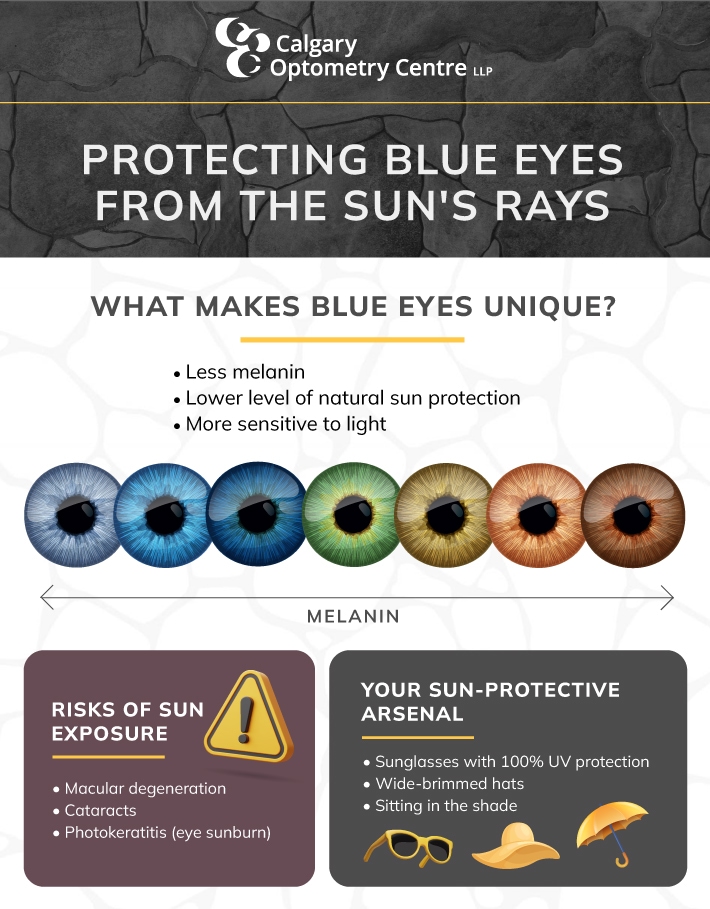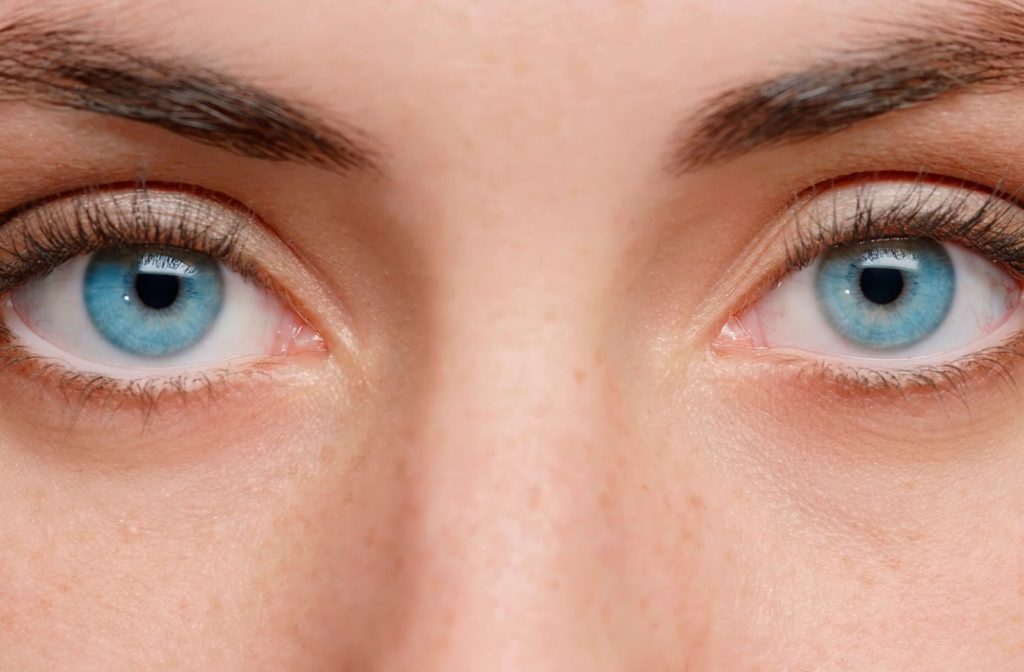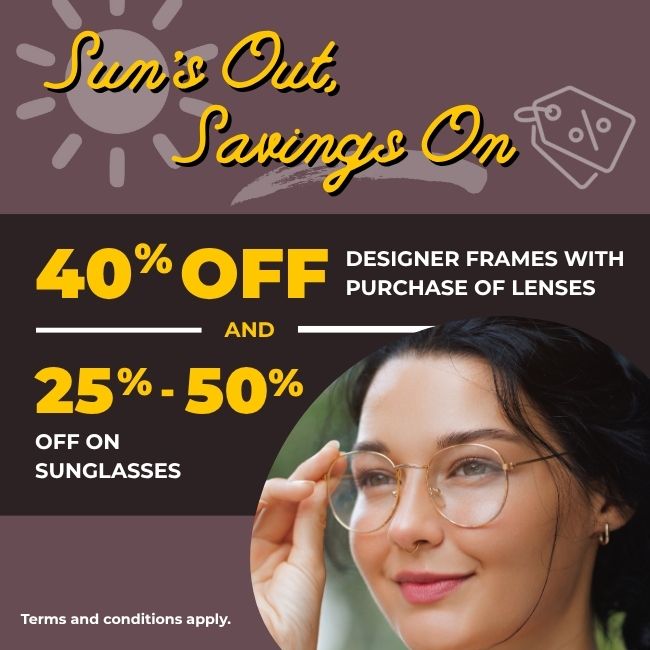For those with blue eyes, sunlight sensitivity may not just be a figment of their imagination—there’s science behind the squinting. Individuals with lighter eye colours, like blue or green, tend to have greater sensitivity to sunlight.
This heightened sensitivity doesn’t only affect your visual comfort but can also have implications for your long-term eye health. Chronic exposure to sunlight without eye protection can lead to eye diseases or photokeratitis, which is a sunburn of the eye. You can protect yourself by learning more about your eyes and investing in sunglasses that block 100% UVA and UVB light.
The Science of Eye Colour
Melanin is a pigment and is responsible for the colourful variety we see in human eyes. The amount of melanin in the iris, the coloured part of your eye, determines your eye colour. More melanin leads to brown eyes, while less melanin results in blue or green eyes. This pigment also acts as a natural sunscreen, protecting your eyes from the damaging effects of sunlight.
People with less melanin, like those with blue or green eyes, have a lower tolerance for bright light and may experience discomfort in sunny conditions. Darker eyes contain more melanin, providing a built-in defence against light sensitivity and some UV rays.
Melanin only offers partial protection, so everyone needs UV-blocking sunglasses for complete eye protection.

The Impact of Blue Eyes on Sun Sensitivity
Research suggests that people with blue or green eyes may experience discomfort or vision problems after prolonged exposure to bright light. This sensitivity, known as photophobia, can lead to conditions like corneal inflammation (photokeratitis) in some cases.
Melanin acts like a light absorber within the eye. Eyes with less melanin allow more light to scatter within the eye instead of focusing properly. This scattered light, called intraocular straylight, can disrupt vision and contribute to:
- Reduced contrast sensitivity: Difficulty distinguishing between similar shades of colour.
- Disability glare: Blurred vision caused by bright light, like headlights at night.
However, the scientific evidence is not absolute—not all blue-eyed individuals will be equally sensitive to light. The general trend suggests that they should take extra care in the sun.
Myth or Fact: Do Blue Eyes See Better in the Dark?
Contrary to popular belief, individuals with blue eyes don’t see better in the dark than those with darker eye colours. Night vision is linked more to the rod photoreceptors in the retina than to the colour of the iris. Rods allow us to see in low-light conditions and can be found in all eyes, regardless of colour.
One preliminary study suggested that those with blue eyes may be able to see better in dim light conditions, but the study was too small to draw any concrete conclusions.
Mitigating Sun Sensitivity for Blue Eyes
While light sensitivity can be a bother, it can be managed. The easiest and most effective way to do this is with sunglasses. Aside from shades, blue-eyed people or those with blue-eyed children stay in the shade as often as possible or wear a wide-brimmed hat, especially between peak daylight hours.
It’s also important to note that having blue eyes doesn’t automatically put one at a higher risk for ocular health issues if proper protection and care are observed. Regular visits to the eye doctor, maintaining a healthy lifestyle, and wearing the appropriate eye protection can help keep blue eyes—and all other eye colours—looking toward a bright, healthy future.
Finding the Right Pair of Sunglasses
When shopping for sunglasses, consider the design and the level of protection they offer. Look for sunglasses that provide 100% protection against both UVA and UVB rays. The sticker or tag should clearly state 100% UV protection or UV400, indicating they block light rays as small as 400 nanometers, covering all UVA and UVB rays.
The fit of your sunglasses is equally important. Choose sunglasses that fit well on your face, covering your eyes completely from all angles. Wraparound styles or larger frames can offer additional protection by blocking sunlight that could enter around the edges of smaller frames.
While darker lenses don’t necessarily provide better UV protection, they can reduce eye strain in very bright conditions. For blue eyes, amber or brown-tinted lenses filter out some incoming light, particularly blue light, which can help reduce straylight and improve contrast, especially in environments with a lot of blue light, like sunny days or open water. These
Remember, the best sunglasses for you are those you feel comfortable wearing. Consistent use is key to protecting your eyes, so make sure the pair you choose is one you’ll want to wear every time you step outside.
Protect Your Eyes, No Matter the Colour
Regardless of eye colour, investing in quality eye care and taking the necessary precautions under the bright sun is a small but vital step toward supporting a lifetime of clear, comfortable vision.
Staying informed and equipped with the right knowledge is the first line of defence against sunlight sensitivity and associated eye conditions. Whether your eyes are the colour of the sky over Calgary or the deep hues of Alberta’s forests, prioritize your health by taking the right precautions. Book an appointment at Calgary Optometry Centre for your next checkup and check out our wide range of UV-protective sunglasses options.




